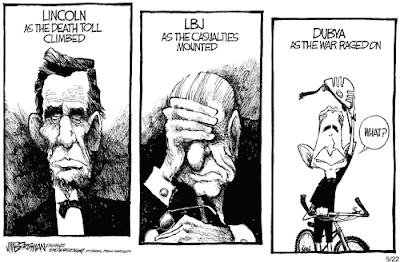Wednesday, May 23, 2007
I was looking for the audio link of the Carter interview which demonstrates clearly that his remarks on W were not misinterpreted, misquoted or taken out of context, but it appears to have disappeared.
However, I did find this interesting blog about religion and journalism, which not only wraps up the entire incident but offers some interesting moderated commentary. Apparently the bloggers are not only willing to delete comments that are irrelevant to the purpose of the blog but weigh in to keep things on-topic. This amazing secret keeps the flamers to a minimum and makes the blog worth a visit regardless of the actual subject matter. I'm bookmarking this one.
The comments on Columbia Journalism Review's blog, by contrast, are useless -- a handful of flamers ranting at each other and none of them making serious points about the various entries. Religion isn't the only thing the media apparently don't get -- Over at the Poynter Institute, there's a discussion of how to keep things civil but allow "The People" to be heard.
IMNSHO, there are a lot of people who don't deserve to be heard. If there is one thing my brief stint in talk radio taught me, it's the difference between who thinks and who dials the phone. The frequent callers are not representative of the average person. However, there is a fascination in extreme behavior that will provide an audience for movies like "Jackass," for radio shock jocks, for exploitive reality shows and for what, in an earlier age, would have been called inappropriate material.
Is this the first time in history we've seen crowds gather to sup the swill? Certainly not. In post-medieval times, the entertainment in the public square was coarse, bawdy and frequently cruel and violent, and people crowded to enjoy it.
But those people were disenfranchised cogs in the machine. They were flesh-robots and cannon-fodder whose views and opinions were not part of what guided the polity. Once we began to count on them to participate in governing, we also started a system of public schools and general attempts at moral uplift.
Today, that's seen as oppressive, and the Voice of the People is revered. Well, that's theoretically a good thing, but, if the media were really interested in hearing what people think, and not just gathering a throng of gape-jawed peasants for their Punch-and-Judy show, they'd invest more money in polling and in competent reporting rather than simply opening the gates to the loudmouths who represent our basest instincts while intimidating and shouting down our better sides.
One of my favorite quotes on this topic is from Edmund Burke:
Because half-a-dozen grasshoppers under a fern make the field ring with their importunate chink, whilst thousands of great cattle, reposed beneath the shadow of the British oak, chew the cud and are silent, pray do not imagine that those who make the noise are the only inhabitants of the field; that of course they are many in number; or that, after all, they are other than the little shrivelled, meagre, hopping, though loud and troublesome insects of the hour.
And as far as ranking presidents goes, I consider Jimmy Carter a representative of our better sides. But what he said about the Bush administration would have been correct no matter who said it.
Subscribe to:
Post Comments (Atom)

5 comments:
I think you demonstrated my belief. Everyone should have a voice but there are a lot of people I don't want to listen to and would hope others don't either.
There are a million blogs out there but I don't feel any urge to read all of them. I hope that really good ones will rise to the top but, as you pointed out, extreme ones or nasty ones are probably more likely to do so.
My biggest fear about reality shows and just opening up to the loudmouths isn't popularity as much as cost. This type of media is the cheapest to produce so it will probably last longer than similar trends because it doesn't need to bring in as much revenue to make a greater profit.
How embarrassing! It looks like the Onion ran the same story as you today:
Study: 38 Percent Of People Not Actually Entitled To Their Opinion
"On topics from evolution to the environment to gay marriage to immigration reform, we found that many of the opinions expressed were so off-base and ill-informed that they actually hurt society by being voiced,"
http://www.theonion.com/content/news_briefs/study_38_percent_of_people?utm_source=slate_rss_1
Onion is a humor site, you understand.
In this case, the joke is that it's a helluva lot more than 38%.
I think about this a lot, the distance between "people are stupid sheep" and "people should be in charge of their own government and destinies." I sort of look at representative democracy as an on-going experiment to see if those two truths can be reconciled. The experiment's only been running a couple hundred years; as far as I'm concerned, the jury's still out.
But, it's the team we signed up for I'm willing to give it a shot. I look at it as the proposition that at least 51% of the people are right at least 51% of the time--which still leaves a lot of room for error but trends toward self-correction in the long run. Sometimes my mild optimism really requires a leap of faith against all evidence, though.
I'm certain that at some point I've shared my experience with David Newman, formerly with WJR AM 760 out of Detroit.
Although I doubt you would have enjoyed his point of view, I believe you would have enjoyed the way he conducted his talk show. He gave lots of time to people that could intelligently express a point of view...any point of view...and little if any to courser callers that were long on adjectives and short on nouns and verbs.
It can be done...successfully, too.
Post a Comment